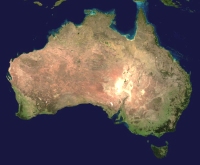A consultation towards a new energy policy for Australia is meant to dodge the difficult question of nuclear power although several submissions are giving the government strong advice on it anyway.
 |
| Australia:How long can it ignore nuclear? |
Late this year, Australia's ruling Labor party is to unveil a new set of policies to guide the country's energy development up to 2030 in the context of climate change. Currently nuclear power is prohibited and uranium exports are promoted as an environmental good for other countries, but the consultation seeks to avoid addressing this discord by stating in the terms of reference that it will cover only fossil and renewable energy resources.
Nevertheless several submissions to the consultation make reference to nuclear power and the government's obtuse position. Typical is that from mining giant Rio Tinto, which says "it is clear that every option must be available" before going on to call for "sensible and prudent" steps to be taken to "build the capacity to make a decision on nuclear by 2020" so that it could be in use by 2030 if required.
The Minerals Council of Australia agrees: "there should be no artificial restrictions on low-emissions power generation provided they are safe, reliable, cost-competitive and environmentally sustainable." It adds that nuclear power has the potential to cut Australian emissions by 8-17% by 2050. "Australia's national energy policy should provide for the consideration of domestic nuclear power as it balances the economic, environmental and energy security factors of the energy mix."
Restricting technology choices leads to higher power prices, said the Business Council of Australia and "the role of uranium and nuclear power over the period to 2030 must be explicitly addressed in the white paper."
Major Energy Users Inc goes further: "Nuclear power should be considered as an option and be allowed to be developed. What prevents its implementation is a government policy that it is not acceptable."
Ansto, the Australian Nuclear Science and Technology Organisation, placed nuclear power as an option to be considered "in a well balanced and forward-looking approach to energy supply." It said that 25 large reactors could provide one third of Australia's electricity and save 170 million tonnes of carbon dioxide per year compared to the current mix that relies 78% on unmitigated coal and has seen emissions rise 44% since 1990.
Ansto noted that with current policies there is no second option for clean Australian baseload if capture and storage of coal pollution cannot be commercialised.
Submissions to the consultation may be made until September.





_18570.jpg)
_16159.jpg)
_49205.jpg)





